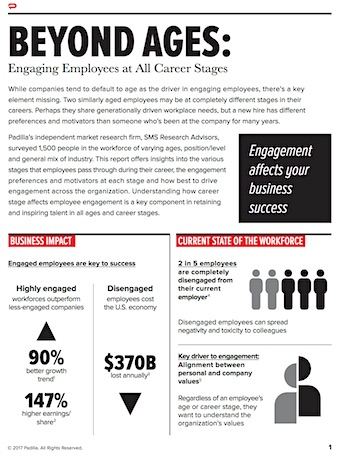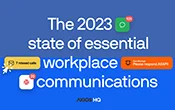Two out of every five employees — or 40 percent — characterize themselves as disengaged from their current job. What’s worse, that level of workplace detachment appears pervasive across generations — from Gen Z and Millennials to Gen X and Boomers — as well as job title. But depending on what stage employees find themselves in their career, staffers expressed varying traits they believe contribute to their engagement at the workplace, according to key findings in a new research report commissioned by Padilla that sheds some light on how employee engagement affects the workforce in every area from staff retention to earnings.
The study, titled “Beyond Ages: Engaging Employees at all Career Stages,” analyzed employees across varying stages in their career in a bid to understand what motivates them and how those preferences differ depending on how long employees have been on the job.
The study’s findings suggest that where an employee finds him/herself in the course of their career may be a far more accurate indicator in determining what engages them at the job, as opposed to mere age or even title.
 |
Padilla defined employees across four key career stages: Newbie, Sophomore, Tenured and Sage. For the Newbie demographic, or those who’ve have been with a company for three years or less, the study found that the top motivator for a majority of this group — 59 percent — is the prospect of learning new skills or gaining new knowledge. Funding for life priorities and saving for retirement were seen as top challenges for members of this demographic.
In regards to the Sophomore group, or those who’ve have been with a company between four and seven years, good performance was cited by 63 percent as a top motivator. The study found that nearly a third of this demographic — 29 percent — also said they fear getting stuck or not feeling challenged enough.
For the Tenured demographic, or employees who’ve have been at the company between eight and 10 years, 58 percent said a top motivator involves contributing to the company’s overall goals. Saving for retirement was cited as a top challenge.
Finally, there’s the Sage stage, or those who’ve been with a company for 11 years or more. A clear majority of this demographic — 63 percent — said feeling pride in having accomplished a task was a top motivator.
On the other hand, the study also discovered some universal agreement regarding what values employees ranked as the top drivers of engagement, regardless of their age or where they find themselves in their career.
A workplace that treats all employees fairly and with respect, regardless of employees’ position or level, took the highest average importance rating, at 8.6 out of 10. Employers that genuinely care about the health and well-being of their staff and workplaces that promote a positive culture were also rated highly by employees across all career stages.
Employees also said they widely prefer financial incentives in the form of employee rewards as opposed to mere recognition for their efforts.
The study, which was conducted by market research firm SMS Research Advisors, polled 1,500 workforce professionals in August of varying ages and across industry and staff positions.


 Most company leaders feel that they’re doing a good job when it comes to internal comms, according to communications management platform Axios HQ. Employees, however, aren’t quite so sure.
Most company leaders feel that they’re doing a good job when it comes to internal comms, according to communications management platform Axios HQ. Employees, however, aren’t quite so sure. More than a third of small-business owners continue to work with their most problematic clients, according to a recent report.
More than a third of small-business owners continue to work with their most problematic clients, according to a recent report. The November presidential election could set into motion a period of uncertainty, social unrest and panic, which includes disruption in many workplaces. Here are a few steps business leaders can take to avoid an employee election meltdown.
The November presidential election could set into motion a period of uncertainty, social unrest and panic, which includes disruption in many workplaces. Here are a few steps business leaders can take to avoid an employee election meltdown. Without financial transparency about both salaries and profits, there will always be a degree of suspicion as to where all the profits go, as well as resentment from the staff for the strict code of secrecy about agency finances in general. (1 reader comment)
Without financial transparency about both salaries and profits, there will always be a degree of suspicion as to where all the profits go, as well as resentment from the staff for the strict code of secrecy about agency finances in general. (1 reader comment) WPP’s Mark Read has hired Jacqui Canney, executive VP-chief people officer at Wal-Mart Inc., to oversee talent management, leadership development, rewards and recruiting activities of the ad/PR combine.
WPP’s Mark Read has hired Jacqui Canney, executive VP-chief people officer at Wal-Mart Inc., to oversee talent management, leadership development, rewards and recruiting activities of the ad/PR combine.


 Have a comment? Send it to
Have a comment? Send it to 
No comments have been submitted for this story yet.